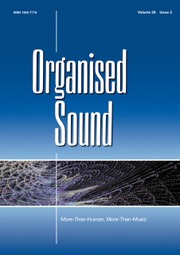No CrossRef data available.
Article contents
Empowerment and Disempowerment in the Participatory Culture of TransCoding
Published online by Cambridge University Press: 29 November 2019
Abstract
In this article, I consider implications of outreach practices in the field of contemporary music for the field itself and for the professional artists involved. I am interested in what happens if we facilitate access to contemporary music for audiences of any kind of demographic, break down barriers, share authority between participating non-professionals and professional artists and allow all participants of a project influence on jointly created artworks. I investigate in how far the organisational or structural change in the creative practice and the creative outcome – that comes along with bringing new players into the field – has consequences on the personal practice of the professional actors in such a project. I base my article on theories of sociologist Pierre Bourdieu, communication scholar Henry Jenkins, art historian Claire Bishop, musicologist Elena Ungeheuer and my own research into social structures of the contemporary art field, and apply them to a single case study: the artistic research project TransCoding – From ‘Highbrow Art’ to Participatory Culture, funded by the Austrian Science Fund. Using the method of thick description, I take the reader through the history of TransCoding, give account of field experiences and put the found patterns of cultural-social experiences into a theoretical context. I investigate the power shifts from professional artists to audience that occurred on the basis of creative, participatory processes within this project. In doing so, I would like to raise questions and stimulate discussion with regard to the conditions and social organisations of creative practice in the contemporary music field, the distribution of power and how this is felt when ‘bringing new audiences to new music’ into the core practice of professional artists, the actual creation of a new work.
- Type
- Articles
- Information
- Organised Sound , Volume 24 , Issue 3: Bringing New Music to New Audiences , December 2019 , pp. 289 - 296
- Copyright
- © Cambridge University Press, 2019




